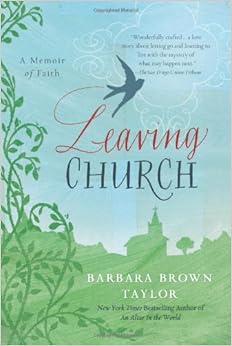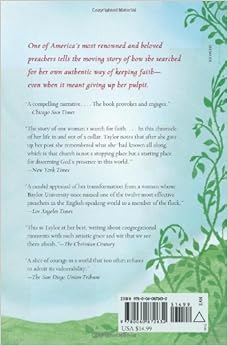From Publishers Weekly
Starred Review. A widely acclaimed preacher, Taylor draws on her homiletical skills in this finely crafted memoir with a simple plot: an Episcopal priest exhausts her inner resources, first in an urban church and then in a small country parish; she changes jobs, struggles and finds renewal. Such a synopsis, however, does not do justice to Taylor's literary style in this rich evocation of her lifelong love affair with God. "When I think of my first cathedral," she writes, "I am back in a field behind my parents' house in Kansas, with every stalk of prairie grass lit up from within." Drawn to the church, she compulsively overworks: "I had such a strong instinct for rescue that my breasts fairly leaked when I came across those in need of rescuing." Though she has found new employment, she realizes she is still a priest: "I miss being a lightning rod, conducting all that heat and light not only from heaven to earth but also from person to person." Current and former clergy will relate to her comical and sometimes touching descriptions of parish life, while memoir buffs will savor her journey as she identifies her core beliefs, sets boundaries and learns to relish her "blessed swath" of the world.
(May) Copyright © Reed Business Information, a division of Reed Elsevier Inc. All rights reserved.
--This text refers to an out of print or unavailable edition of this title.
Episcopal priest Taylor, a respected and beloved preacher, ended a 20-year career when, after much reflection, she left the church. She had expected to spend the rest of her life writing sermons and leading worship. Instead, she now teaches full time at a college in Georgia. With its three indicatively titled sections--"Finding," "Losing," "Keeping"--
Leaving Church aims to explain her compulsion to leave the familiar behind. When she was first ordained and for years thereafter, she felt certain about the fundamentals of her own faith and what it meant to be Christian. But she slowly realized that she was conflicted, internally and with the church, in large part because of church-inclusiveness controversies, including gay and lesbian issues. She laments that while ostensibly protecting the integrity of scripture and church doctrine, people can trample the rights of others. She discovered that change isn't easy. Sometimes, even getting dressed in the morning seems an insurmountable challenge. Ultimately, Taylor's is a luminous portrait of faith not lost but questioned, refound, and regained.
June SawyersCopyright © American Library Association. All rights reserved
--This text refers to an out of print or unavailable edition of this title.







